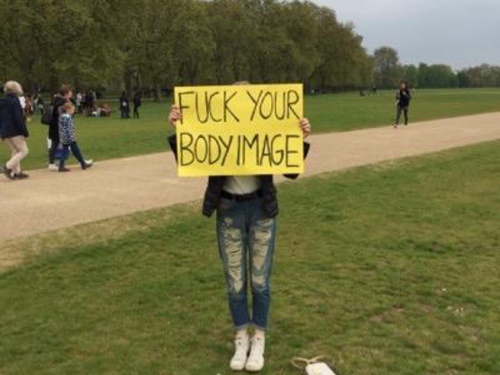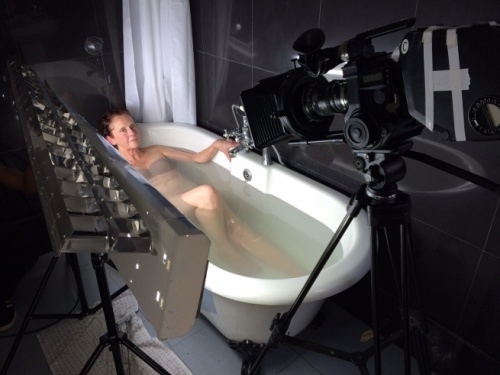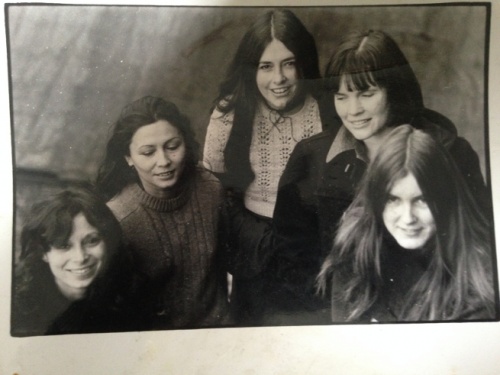Girls in Film
An Interview with Nikola Vasakova
Chantelle Linane and Gwendolin Barnard spoke to Girls in Film [GiF] founder Nikola Vasakova about tackling gender bias in the film industry, diversity and her aims for the organisation.
What is Girls in Film (GiF)?
GiF is a network for supporting emerging female filmmakers and advocating their work. My main aim was to create a space where like-minded filmmakers could talk about collaborating and supporting each other - that’s really important to me. For example, our first event focused on branded content and we invited leading women in the industry to give a talk. The latest one was at the ICA where we held a directing workshop. So these events are about teaching new skills but they're also an opportunity to find other women to collaborate with. I’m really about ‘knowledge is power’. So, that was my initial thought but now it’s also growing a little bit. We are currently looking at setting up short courses. As a producer I’m hoping to take on more female filmmakers to make more films together and get brands, media outlets and hopefully some organisations to make films together. I would like this to become not just a network but an enabler in the industry.
What is your aim as a network that supports women?
A lot of people talk about diversity but they don’t act on it directly. I really want to change that. This is especially important for young women as they are an underrepresented part of the film industry. When we talk about diversity we talk about support. When we talk about support we talk about giving 50 percent of funding to female directors and that’s great. But they are the directors who have already gone through the grind, have been in the industry for more than 10 or 20 years and tend to be from a middle-class, white background.
"A lot of people talk about diversity but they don’t act"
This is something I—and most of the people in my network—can’t really relate to. GiF is really diverse by its nature. I never tried to focus on that but people came to me from different backgrounds. It has a very inclusive atmosphere. I find networking really intimidating and I want to create events where people feel really comfortable and are happy to talk to each other.
What is the importance of working together?
Collaboration is at the core of my work. I think women can do really great work together when they collaborate. In a sense we have always been raised to envy each other or compete with each other because when we get together there is a power that men might be scared of. So I’m going against that and try to encourage people to work together.
"We have always been raised to compete with each other because when we get together there is a power that men might be scared of."
I always go to different things and get inspired not only by the things I see but by the people I meet. That’s what is so great about starting this. Now I know hundreds of more people with a similar interest.
In the past year in London more and more female collectives have been coming together, such as Siren - an all-female collective supporting women DJs but also making the dancefloor more women- and queer-friendly. Is this emergence of collectives something you have observed too?
Yeah, definitely. There is a new surge of female-led initiatives. When I first started GiF I wasn’t really aware of that. Some people call this fourth-wave feminism but I don’t really think that there is a need for any terms like this. There is now a much bigger focus on under-represented groups within feminism, supporting people from queer, non-binary and BAME backgrounds. That’s really exciting. There are so many initiatives working in London and elsewhere in the UK at the moment, but not necessarily with each other. It would be cool to expand these networks and have them work together.
What are the main problems for women working in the industry? Where are the areas that are getting better?
Oh so many. I think we are getting better at finally recognising and admitting that there is a problem with diversity in the industry. The ratio of men and women who come out of film school is 50/50 but then it is only men who take the top jobs. So, something happens between entry-level and C-level where women just disappear.
"The ratio of men and women who come out of film school is 50/50 but then it is only men who take the top jobs."
That’s something we need to work on. It is a mixture of things such as gender bias—where women are not expected to do well—and there being no female role-models for you to aspire to because women don't reach the top. It is a vicious cycle. There is also no support for women who are mothers. A lot of women drop out of the industry because they can’t juggle motherhood and work.
Do you think the obstacles are also to do with the belief that women filmmakers make films about topics that appeal to women?
Yes. There are a lot of macho films directed by women. A case in point would be the 1991 film Point Break directed by Kathryn Bigelow.
I feel that gender bias is the biggest problem and probably the hardest one to fight - the different expectations of men and women. That’s essentially what does the most damage to women in the industry. There just isn’t enough support - in material terms and in terms of dismantling social expectations of women. To start with, I would say women need to expect just as much of themselves to get as far as men do. People tend to say: "oh yeah, you can be a producer or PA." But why not become a director, a VFX or an editor? Women are sometimes shy to say what they really want to do. As a woman, you don’t always need to take the job of organising people.
"People tend to say: "oh yeah, you can be a producer or PA." But why not become a director, a VFX or an editor?"
There are a lot of initiatives to give women more funding for their films. But this can be quite limiting. We risk creating an all-female bubble in which we are restricted to working and which men will still largely ignore. So we need to change the way people think about the industry. For now I still celebrate all-female collectives and directors. But hopefully in the future it is not going to be a big deal to be a filmmaker who happens to be a woman. I’m quite wary of using the words ‘female-led' or 'female-based’ because it may create this bubble that is only recognised by the feminist corner of the industry that gets ignored by everyone else.
"Hopefully in the future it is not going to be a big deal to be a filmmaker who happens to be a woman."
It is in our name: Girls in Film. We are a space to support women and prop them up in an industry which is full of men. Essentially I’m here to give self-confidence and opportunity but I’m not here to say "I’m just here to do films with each other." GiF is a good starting point but then young female filmmakers should go off and make films with men and smash it. My rather strange hope is that our network will be redundant in the future. But for now it is really important!
How can young women interested in film get involved with you?
Follow me on social media: go on our Twitter or Facebook pages. Or drop me an e-mail at hello@girlsinfilm.net. Just get in touch with me. Everyone is invited to get involved with anything they want to do. This is a network which is built on its members. ■
This article is posted in: Blog, Film, Interviews
Tagged with: Film, Films, Feminism, Women in Film, Girls in Film, Kathryn Bigelow, Gwendolin Barnard, Chantelle Linane, Nikola Vasakova, Intersectionality, Film Industry









